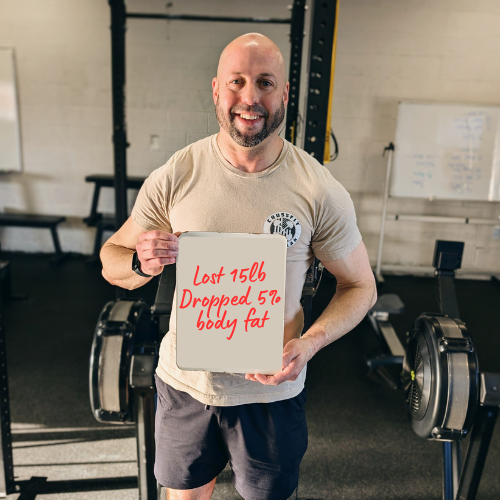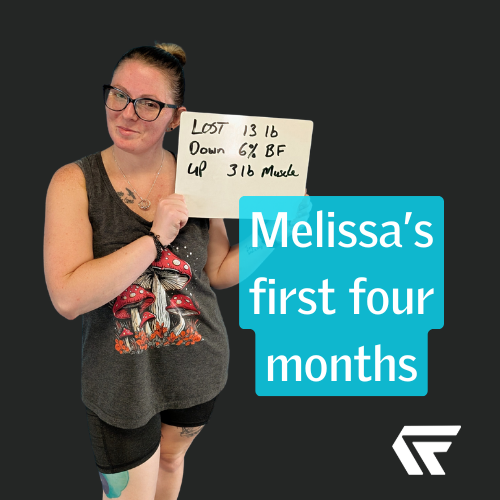Why Intuitive Eating Doesn't Work - And What To Do Instead
There's that person that makes you mad because they seem to eat whatever they want and they still have abs you can see a mile away.
You ask them how they eat to keep up that body and they'll probably say something like this:
"Oh I don't really keep track, I just eat intuitively based on how I feel."
Maddening!
Or there's that gym rat who is super fit and they "just eat based on how they feel".
How does someone eat "intuitively" and get really fit? What does that mean anyway?
When I eat intuitively I'll put down a whole tray of Oreos!
Here’s the truth: intuitive eating sounds awesome in theory, but for most people—especially busy parents who are juggling kids, careers, AND trying to prioritize their health—it’s more confusing than helpful.
There's no structure, no rules, just go with what your body craves. Right?
Here's what they don't tell you.
They didn't start with intuitive eating. They spent 5, 7, 9 years building habits and dialing in their nutritional awareness and knowledge so that eventually they could be done with the calorie counting and food scales. Their body actually craves protein and whole foods rather than the ice-cream.
Intuitive eating is not how most people get in shape or lose 30 pounds. While it's a great goal for sustainability and long-term health, you're better off starting with a system and a structure that's educational and helps you learn proper portion sizes with a daily caloric target and a sheet of paper where you can see your "allowance" in real time.
How do you know if this 2pm snack fits in your daily allowance unless you're keeping track?
I know, "earning your calories" is a bad way of thinking. Yes some people do need to repair their relationship with food and exercise with a different approach for now, but for most wanting to get healthy again, there is a necessary element of "earning your food". If you need to get out and take a 3 mile walk to create a deficit for the day then do it.
Don't think "oh I don't need to earn my calories so I'm just going to sit and watch tv". And wake up next week wondering why you're not down 2 more pounds.
Here me out.
I'm all for eventually being able to trust your body’s signals, enjoy a weekend of splurging, and skip the gym while on vacation. Those a great long-term goals–to be able to do that. But right now, if your goal is to lose 15–20 pounds, tone up, and build strength? Going by feel and the "moment" won’t cut it.
The Real Path to Food Freedom? Structure First.
If you want real results—fat loss, muscle tone, more energy, better sleep—you need a structured approach first.
That means tracking your nutrition accurately. And the more consistent you are early on the sooner you can get away from the food log.
Here’s why:
- You need to know your numbers. If you’re not in a calorie deficit, you won’t lose fat. Period. Doesn’t matter how “clean” you eat.
- You need enough protein. Most women I work with are drastically under-eating protein. That’s why they’re not building muscle or staying full between meals.
- You need to learn what proper portions actually look like and feel like. That “healthy” avo toast is 600 calories before you even blink. I'm not anti-toast, just pro-awareness. That afternoon coffee might be 300 calories even though the menu board says 110.
- It can take several weeks for your body and stomach to adjust to proper portion sizes without you feeling like your always starving or craving carbs.
Tracking your calories and protein for a few weeks—or months—isn’t obsessive. It’s educational.
It teaches you what your body actually needs instead of going by feeling after a stressful day.
But Isn’t Tracking Hard?
Not as hard as spinning your wheels for years and ending up at a place you really don't want to be.
And no you won't have to skip the friends night out or the parties.
Okay yes you will need to make some adjustments at those events too but you already know that.
I'm not talking about logging every crumb for life. I'm talking about taking 10 minutes a day to learn how your choices align with your goals. Once you know what a solid day of eating looks and feels like (for a full week), you can gradually shift toward trusting your instincts.
Start here
Draw three columns down a sheet of paper. After eating or drinking anything with calories, write down a description. Ex: 3 eggs with toast, 1/2 banana with 2TBS peanut butter.
At the end of they day you can leave it at that OR you can then calculate approximately how many calories and protein you ate. Use Google and ChatGPT.
If you want to track real time like I do, grab this snazzy food scale from Amazon. You'll need to load your plate one food item at a time and write down the calories and protein as you build your plate.
It only takes an extra minute for each meal.
Intuitive eating becomes possible after you’ve done the work.
You’ll earn that freedom once your habits, your meals, and your goals are all aligned.
Intuitive eating is a destination, maybe a lifestyle approach that's possible at some point, but likely not the starting point.
If you’re a busy person in your 30s, 40s, or 50s who wants to lose weight, get stronger, and stop guessing with your health, here’s what works:
✔️ Track your food (especially protein)
✔️ Learn your numbers
✔️ Eat 90% unprocessed calories
✔️ Repeat that until it becomes second nature
Then you can eat “intuitively”… because by that point, your intuition will actually be better informed and you'll know how overeating and alcohol actually make you feel.
It's not about crash diets or obsession and I'm definitely not trying to cut out fun and parties. It's about actual coaching and getting back to the basics of what will get you lasting results.







